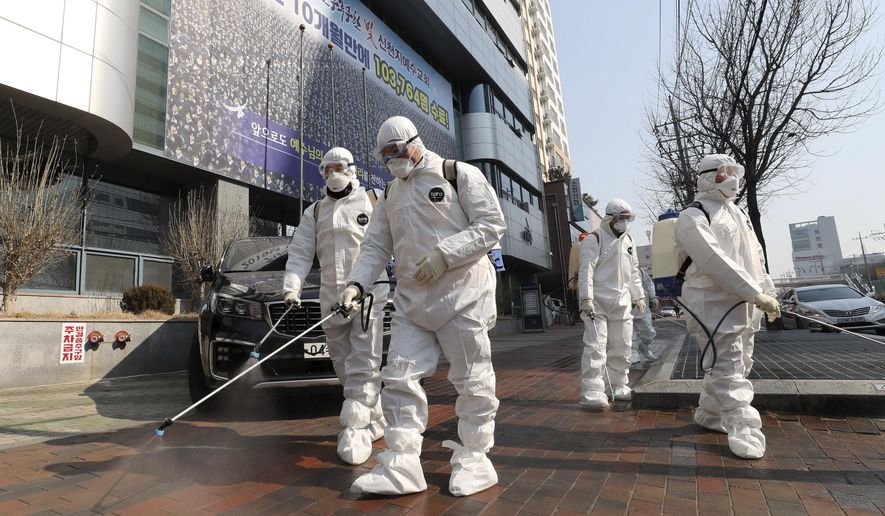The rate of coronavirus infections in China continued to drop Thursday, but flare-ups elsewhere turned a thriving South Korean city into a ghost town and Japan said two elderly passengers of the Diamond Princess cruise ship died as a result of their infections, raising fears about the bug’s global reach.
Daegu, a city in southeastern South Korea, recorded dozens of new cases in recent days, prompting its 2.5 million residents to clear out of normally busy streets and shopping malls.
Fearing the spread of the virus among its armed forces, South Korea also restricted military personnel from taking leave, staying off base overnight or greeting visitors at their installations.
The global creep of the illness known as COVID-19 prompted the World Health Organization to issue a warning: Act now or face an even bigger crisis down the road.
“Let’s not squander the window of opportunity we have,” WHO Director-General Tedros Ghebreyesus said. “The number of cases in the rest of the world is very small compared to what we have in China, but that may not stay the same for long.”
The coronavirus has disrupted global supply chains and travel plans and upended daily life in parts of Asia, particularly at the epicenter of the outbreak in Wuhan, a large city in China’s Hubei province.
Some scientists say the new coronavirus might be here to stay so mitigation will be key.
“We will continue to see spread of the virus beyond China. This virus is efficiently spread in the community and, therefore, is not containable,” said Amesh Adalja, a senior scholar at the Johns Hopkins Center for Health Security. “It is now very clear that the world must move from a containment mindset to one of mitigation.”
China reported fewer than 400 new cases Thursday, though it switched its methodology again and is no longer using chest imaging to confirm infections in Hubei province.
All told, China has reported 74,675 cases and more than 2,100 deaths since the start of the outbreak.
“The data from China continue to show a decline in new, confirmed cases,” Mr. Tedros said. “Once again, we’re encouraged by this trend but this is no time for complacency.”
Outside of China, more than two dozen countries have reported a combined 1,073 cases. At least eight people have died, including two from Iran, which this week reported several cases.
More than half of the cases outside of China are linked to the Diamond Princess, a formerly quarantined cruise ship in Japan. Two of the passengers died from COVID-19, authorities confirmed Thursday.
One of them was an 87-year-old man who had bronchial asthma, and the other was an 84-year-old woman without an underlying condition, reported NHK, a Japanese news outlet.
NHK quoted a Japanese Health Ministry official as saying authorities “handled the situation appropriately.”
“We transferred the two passengers to hospitals as soon as we learned they had a fever. That was before we even had their test results,” Masami Sakoi said.
Critics said there was a lag time between the woman falling ill and being hospitalized, adding to doubts about how the quarantine of passengers and crew was handled. More than 630 people on the ship became infected.
Japan has advised disembarking passengers to stay at home for 14 days. It also set up a hotline for people with any concerns.
The country is battling dozens of additional COVID-19 cases, bringing its national total to more than 700.
South Korea, meanwhile, reported 53 new cases Thursday, raising its total to 104.
The city of Daegu and its surrounding province accounted for 70 of those cases, according to the Yonhap News Agency.
Authorities are reportedly examining whether a 61-year-old South Korean woman became a “super-spreader” by attending church services in the area.
Daegu Mayor Kwon Young-jin urged the 2.5 million residents of the city to remain indoors. They appeared to heed that advice. Reuters reported that the streets, stores and cinemas were deserted.
South Korea also reported its first death from COVID-19.
In response, WHO reiterated its plea to fight the disease before it spreads further.
“I think the number of cases [is] really manageable, and I hope South Korea will do everything they can to contain this outbreak at this early stage,” Mr. Tedros said.
Dr. Adalja said COVID-19 is likely to establish itself as a worldwide seasonal virus alongside four others known as OC43, 229E, NL63 and HKU1.
The new virus’ persistence has set off a scramble for a vaccine or therapeutic drugs.
WHO is running tests to determine whether certain drugs for HIV/AIDS or other antivirals can work as a therapy for COVID-19.
Mr. Tedros said researchers expect results of clinical trials within three weeks.
The Pharmaceutical Research and Manufacturers of America, a key lobby for U.S. drugmakers, said its members are lending their expertise by donating investigational compounds that might be able to treat coronavirus, including some tested against Ebola and HIV.
Companies are also working on a vaccine, donating millions of dollars to the fight and collaborating with Chinese and U.S. health agencies, PhRMA President and CEO Stephen J. Ubl said.
• Tom Howell Jr. can be reached at thowell@washingtontimes.com.




Please read our comment policy before commenting.